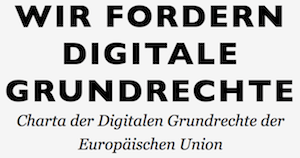A Digital Charta
Published on February 6, 2017 (↻ June 5, 2021), filed under Everything Else (RSS feed for all categories).
When we think about it, although we live in a time of rights violations—from ubiquitous and embarrassingly accepted mass surveillance to state torture to state murder—we don’t lack good intent, nor good law.
Good law, and good soft law, is represented through international declarations like the Universal Declaration of Human Rights, the EU Charter of Fundamental Rights, and the European Convention of Human Rights, as well as constitutions that stress human rights like the German one; good intent we find in the many campaigns by organizations like ACLU, EFF, or EDRi, but also in grassroots efforts like The Other Manifesto.
Equipped with good law and good intent, aren’t we all set? Clearly, as the onslaught of right infringements and attacks through ever more invasive laws shows, no (Snowden: surveillance is about power); yet I—what do I know—won’t try to explain what could be happening, nor what we might be able to do about it aside from taking nonviolent action.
Rather, I wish to point to another recent initiative: the Digital Charta (English, PDF, 106 KB). The Digital Charta, started by a few German citizens, intellectuals, and politicians, ties itself to the Universal Declaration of Human Rights, the European Convention of Human Rights, and the EU Charter of Fundamental Rights, and then commits to human rights as they translate to our digital age. The result, though aimed at European policy and perhaps never an effective legal instrument, is still a powerful manifesto, a strong testament to the importance of everyone’s rights in the digital realm, and a potent reminder that we must insist on and defend these rights.
All I wish to stress with the Digital Charta, then, is that there is plenty of good intent, also still plenty of good law, and maybe—I often find myself wondering about convincing action—we might at some point now focus more on good change, change that is constructive, prompt, and effective.
About Me

I’m Jens (long: Jens Oliver Meiert), and I’m a frontend engineering leader and tech author/publisher. I’ve worked as a technical lead for companies like Google and as an engineering manager for companies like Miro, I’m close to W3C and WHATWG, and I write and review books for O’Reilly and Frontend Dogma.
I love trying things, not only in web development (and engineering management), but also in other areas like philosophy. Here on meiert.com I share some of my views and experiences.
If you’d like to do me a favor, interpret charitably (I speak three languages, and they do collide), yet be critical and give feedback for me to fix issues, learn, and improve. Thank you!
Read More
Maybe of interest to you, too:
- Next: 10 Photos IV
- Previous: The Great Neglect
- More under Everything Else
- More from 2017
- Most popular posts
Looking for a way to comment? Comments have been disabled, unfortunately.

Get a good look at web development? Try WebGlossary.info—and The Web Development Glossary 3K (2023). With explanations and definitions for thousands of terms of web development, web design, and related fields, building on Wikipedia as well as MDN Web Docs. Available at Apple Books, Kobo, Google Play Books, and Leanpub.

